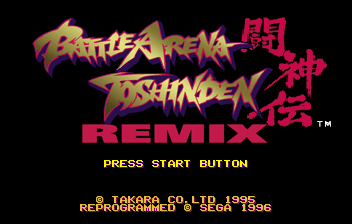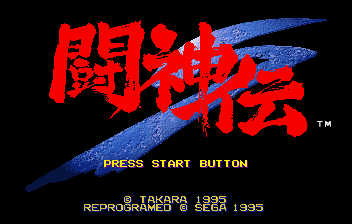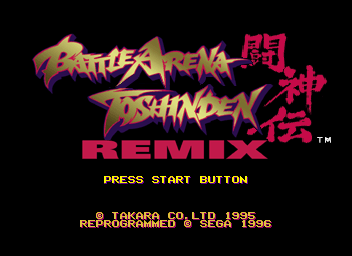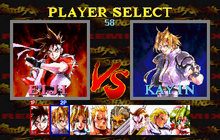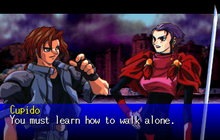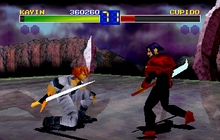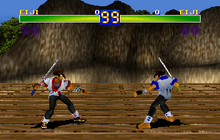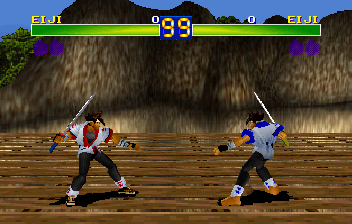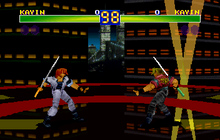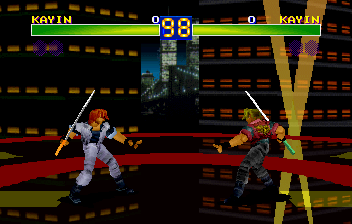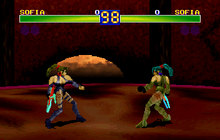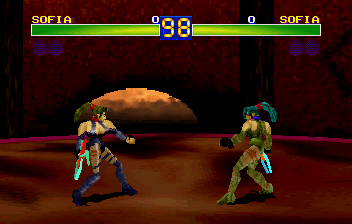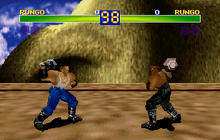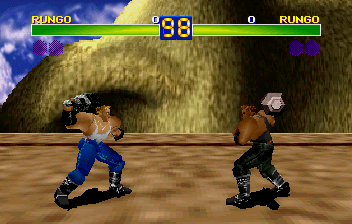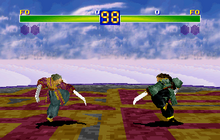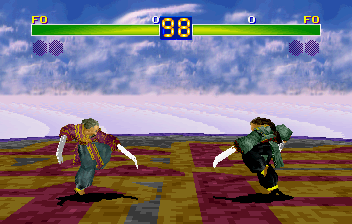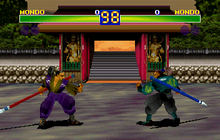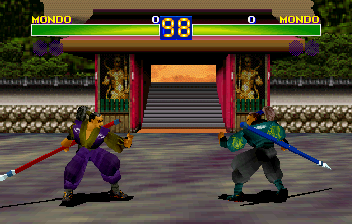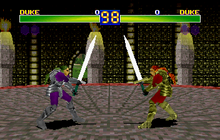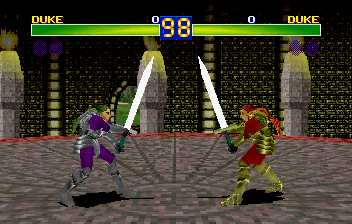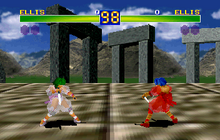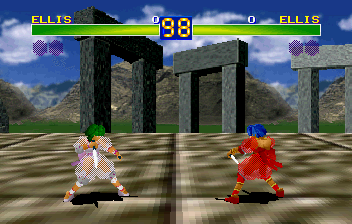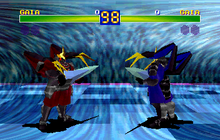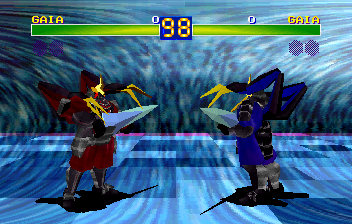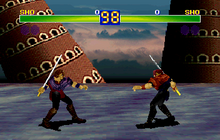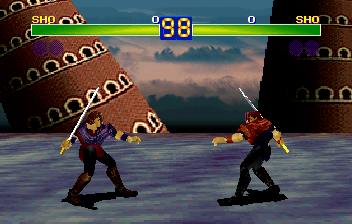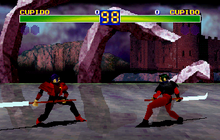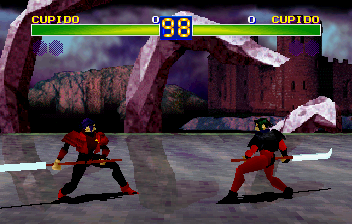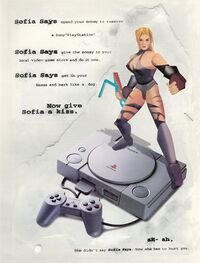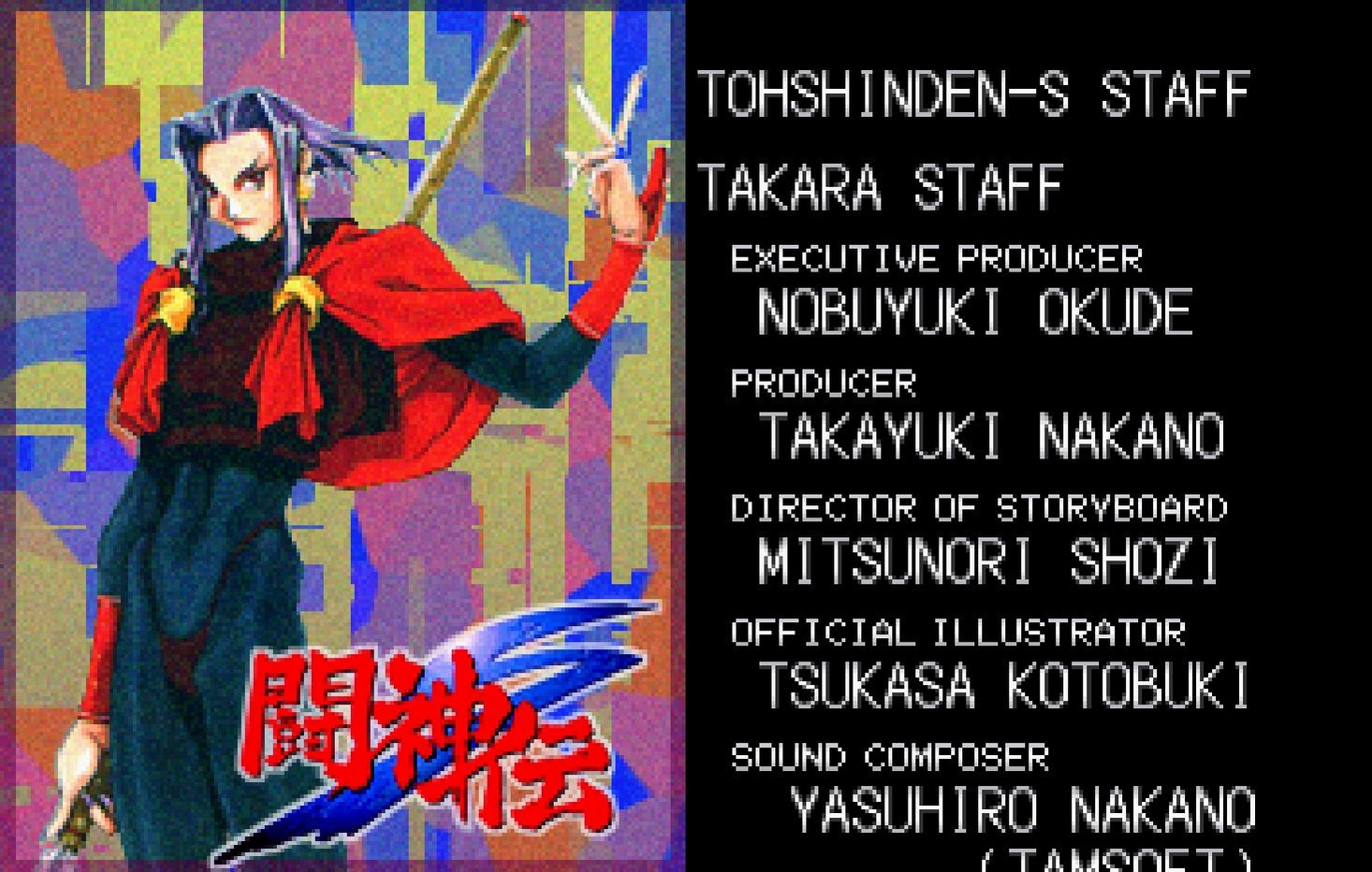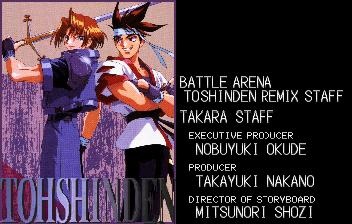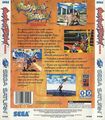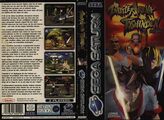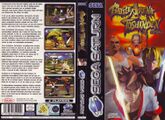Battle Arena Toshinden Remix
From Sega Retro
| ||||||||||||||||||||||||||||||||||||||||||||||||||
| Battle Arena Toshinden Remix | ||||||||||||||||||||||||||||||||||||||||||||||||||
|---|---|---|---|---|---|---|---|---|---|---|---|---|---|---|---|---|---|---|---|---|---|---|---|---|---|---|---|---|---|---|---|---|---|---|---|---|---|---|---|---|---|---|---|---|---|---|---|---|---|---|
| System(s): Sega Saturn | ||||||||||||||||||||||||||||||||||||||||||||||||||
| Publisher: Sega | ||||||||||||||||||||||||||||||||||||||||||||||||||
| Developer: Nextech | ||||||||||||||||||||||||||||||||||||||||||||||||||
| Distributor: Sega-Ozisoft (AU), Tec Toy (BR) | ||||||||||||||||||||||||||||||||||||||||||||||||||
| Licensor: Takara | ||||||||||||||||||||||||||||||||||||||||||||||||||
| Original system(s): PlayStation | ||||||||||||||||||||||||||||||||||||||||||||||||||
| Developer(s) of original games: Tamsoft | ||||||||||||||||||||||||||||||||||||||||||||||||||
| Sound driver: SCSP/CD-DA (11 tracks) | ||||||||||||||||||||||||||||||||||||||||||||||||||
| Genre: Action[1][2] | ||||||||||||||||||||||||||||||||||||||||||||||||||
| Number of players: 1-2 | ||||||||||||||||||||||||||||||||||||||||||||||||||
|
Battle Arena Toshinden Remix, called Toshinden S (闘神伝S) in Japan, is a 3D fighting game in Takara's Battle Arena Toshinden series of games, released for the Sega Saturn in 1995. It is an enhanced port of the 1995 PlayStation game, Battle Arena Toshinden (simply known as Toshinden in Japan).
Contents
Story
Gaia, the leader of a secret underworld organization, has invited the world's best fighters to compete in the Battle Arena Toshinden, a weapons fighting tournament broadcast as bloodsport entertainment for the world's shadowy elite.
Gameplay
The game is one of the first fighting games, after Virtua Fighter, to feature fully polygonal characters in a 3D environment. While it retains some of the characteristics of 3D fighting games established by Virtua Fighter, such as floaty jumping and a camera that zooms in and out depending on how far apart the fighters are, the gameplay and special moves are less realistic (including fireballs) and more influenced by the Street Fighter series of games, with a sidestep maneuver similar to the Fatal Fury games. Every character fights using a weapon, like the Samurai Shodown games, preceding other weapons-based 3D fighters such as SoulCalibur. Battles are fought to the best of three bouts. As with other games of the genre, a player wins a bout by depleting the opposing fighter's health, having more health than the opponent if time runs out, or knocking the opponent out of the arena. It is also possible to lose a bout by falling out of the arena accidentally or to draw if both fighters fall.
Characters move with ![]() and
and ![]() and crouch with
and crouch with ![]() . Normal movement is slow, but characters can dash with
. Normal movement is slow, but characters can dash with ![]()
![]() or
or ![]()
![]() ; dashes can be canceled by tapping in the opposite direction. They jump upward with
; dashes can be canceled by tapping in the opposite direction. They jump upward with ![]() and jump behind and ahead with
and jump behind and ahead with ![]() or
or ![]() . The fighters can move around the 3D arenas by rolling forwards (toward the screen) with
. The fighters can move around the 3D arenas by rolling forwards (toward the screen) with ![]() or
or ![]() or rolling backwards (away from the screen) with
or rolling backwards (away from the screen) with ![]() or
or ![]() , which can be used to dodge projectile attacks or get out of a dangerous spot. Characters can perform an alternating rotation with
, which can be used to dodge projectile attacks or get out of a dangerous spot. Characters can perform an alternating rotation with ![]()
![]() , which performs a roll in either direction.
, which performs a roll in either direction.
Characters attack by slashing with their weapon with ![]() for a weak slash or
for a weak slash or ![]() for a heavy slash, or they can kick with
for a heavy slash, or they can kick with ![]() for a weak kick or
for a weak kick or ![]() for a heavy kick. Weak attacks are faster, but heavy attacks do more damage. Each character has his or her own unique set of basic moves, special attacks, and a Desperation move that can only be used when the character has low health and the vitality bar is flashing. Characters also have "secret" special moves that have more difficult button combinations to perform but do more damage if they connect.
for a heavy kick. Weak attacks are faster, but heavy attacks do more damage. Each character has his or her own unique set of basic moves, special attacks, and a Desperation move that can only be used when the character has low health and the vitality bar is flashing. Characters also have "secret" special moves that have more difficult button combinations to perform but do more damage if they connect.
Characters can block basic attacks and reduce most of the damage from special moves by holding the D-Pad in the opposite direction of the opponent. Blocking can be done while standing or crouching but not while jumping. Characters can grab and throw opponents by pressing the D-Pad away from the opponent while pressing a heavy punch or kick button.
Modes
The game has the following modes:
- Story Mode: A Saturn-exclusive single-player mode. The player chooses any character and fights a series of matches against four opponents, who vary depending on the character chosen. Matches are preceded and followed by story-related dialogue. After winning the first four battles, the character proceeds to fight the boss character Gaia. The game can be continued an unlimited number of times if a match is lost, but if the player can defeat Gaia and every preceding opponent without using a continue on Normal difficulty or higher, a fight against the secret final boss Sho is unlocked. If the player can defeat Sho without using a continue, a final match against the Saturn-exclusive character Cupido is played.
- 1P Game: A single-player mode where the player chooses any character and fights eight matches against every other playable character in the game (including a mirror match against the same character). After winning all eight fights, the player fights the tournament's mysterious host, Gaia. As with the Story Mode, if the player defeats every opponent without using a continue on Normal difficulty or higher, fights against Sho and ultimately Cupido are unlocked. A second player can join at any time to challenge the first to a match by pressing START .
- Vs Human: A two-player mode where both players can choose any character.
- Vs Computer: A single-player mode where the player can fight a match against any computer-controlled opponent.
There are several difficulty levels for computer-controlled opponents (Very Easy, Easy, Normal, Hard, and Very Hard). Players can also change the amount of time per bout (0 for unlimited, 60 seconds, or 99 seconds, which is the default), the number of wins needed to win a match (between 1 and 5, with a default of 2), set the strength of each player (50, 75, 100, 150, or 200, with a default of 100 for each player), and toggle auto-defense for each player.
Characters
Note: Move lists assume that the character is facing right. When facing left, ![]() and
and ![]() should be reversed.
should be reversed.
| S | Any slash button |
| LS | Light slash |
| HS | Hard slash |
| K | Any kick button |
| LK | Light kick |
| HK | Hard kick |
When playing on Very Easy or Easy difficulty, control schemes are available that map the special moves marked as Special 1 and Special 2 to ![]() and
and ![]() respectively and Special 3 and Special 4 to
respectively and Special 3 and Special 4 to ![]() and
and ![]() respectively.
respectively.
Playable
All of the characters from the original PlayStation game return, along with a new character, Cupido.
Bosses
- Main article: Battle Arena Toshinden Remix/Hidden content.
The bosses are playable with cheat codes.
| Gaia | ||||||||||||||||||||||||||||||
|---|---|---|---|---|---|---|---|---|---|---|---|---|---|---|---|---|---|---|---|---|---|---|---|---|---|---|---|---|---|---|
The sponsor of the tournament and boss of the game. His reasons for holding the tournament are shrouded in mystery. He is later revealed to be the father of Ellis. He wears a bulky suit of armor resembling that of a Japanese warlord.
| ||||||||||||||||||||||||||||||
| Sho Shinjo | ||||||||||||||||||||||||||||||
The first secret boss of the game, reached by defeating all of the other opponents without using a continue. He is a merciless swordsman who is Eiji's older brother and was the champion of the previous tournament.
| ||||||||||||||||||||||||||||||
| Cupido | ||||||||||||||||||||||||||||||
The second secret boss of the game, reached by defeating all of the other opponents, including Gaia and Sho, without using a continue. She is a mysterious woman who speaks with cryptic riddles and messages. She fights with a naginata.
|
Stages
Every character has his or her own stage where matches are hosted.
History
Release
In its original incarnation, Battle Arena Toshinden acted as the PlayStation's answer to Virtua Fighter and featured prominently in advertising. This was a battle it was largely considered to have won as a showcase for the then-new generation of hardware, as Toshinden featured texture-mapped fighters and advanced light-sourcing and transparency effects for its time. Virtua Fighter had flat-shaded models, and the Saturn port was notoriously buggy and had reduced screen resolution and lower-polygon models compared to the original arcade game (leading Sega to release Virtua Fighter Remix to correct many of the problems of the port).
In spite of its early success, Toshinden was criticized for having simplistic gameplay. It was soon overshadowed by 3D fighters such as Namco's Tekken on the PlayStation and Sega's Virtua Fighter 2 on the Saturn, as well as by ports of 2D fighters such as Capcom's Street Fighter Alpha. As all of these games were released before Battle Arena Toshinden Remix, the Saturn was considered to have missed out on the original game's initial wave of popularity.
Legacy
A sequel was later released as Battle Arena Toshinden URA, which derives from the PlayStation game Battle Arena Toshinden 2.
The character Eiji appeared as a hidden character in the weapons-based fighting game D-Xhird, which was developed by Nextech (the company that ported Toshinden to the Saturn) and published by Takara (the company that originally published the Toshinden games for the PlayStation).
Versions
With the release of this Remix edition, Battle Arena Toshinden became the first Western title that could be compared directly across the Saturn and PlayStation[9]. However, the results generally favour Sony's machine, which operates at a higher resolution and a higher polygon count. Additionally, the Saturn conversion has to make compromises owing to its lack of alpha transparency. The stage backgrounds of the PlayStation version use 3D models, while they are rendered in 2D on the Saturn. The original Toshinden also runs faster.
Remix adds a new computer-generated introduction, an all-new story mode with voice acting, and a exclusive character called Cupido. This is Cupido's only appearance in the series.
Localised names
| Language | Localised Name | English Translation |
|---|---|---|
| English | Battle Arena Toshinden Remix | Battle Arena Toshinden Remix |
| English (US) | Battle Arena Toshinden Remix | Battle Arena Toshinden Remix |
| Japanese | 闘神伝S | Toshinden S |
Comparisons
- Main article: Battle Arena Toshinden Remix/Comparisons.
Production credits
Japanese version
- Executive Producer: Nobuyuki Okude
- Producer: Takayuki Nakano
- Director of Storyboard: Mitsunori Shozi
- Official Illustrator: Tsukasa Kotobuki
- Sound Composer: Yasuhiro Nakano (Tamsoft), Fumio Tanabe (Tamsoft)
- Original Game Development: Tamsoft
- Special thanks to: All Tamsoft Staffs
- Cast: Masaaki Ohkura, Kaneto Shiozawa, Daisuke Gohri, Yukimasa Kishino, Ryotaroh Okiayu, Yohko Teppohduka, Megumi Terase
- Producer: Hiroshi Aso, Katsuji Aoyama
- Technical Support: Shuichi Katagi
- Director: Masato Shimamura
- System Programmer: Yukihiko Tani
- Director & Programmer: Hiroaki Sano
- Director of Graphic Design & New Character Motion Maker: Yoshihisa Shimizu
- CPU Algorithm Programmer: Nobuhiro Mikami
- Retsuden Mode Programmer: Manabu Takahashi
- New Character Motion Planner: Seiichi Sekine
- Retsuden Mode Planner & CG Design Works: Tetsuya Maeda
- Character Modeler: Munemoto Matsushima, Masahiro Satoh, Hideyuki Kikuchi
- Graphic design: Kazushige Nagai
- CG Movie Works: Yasuhiro Suzuki, Yoshitaka Maki
- Illustrator of Retsuden Mode: Tsukasa Dokite, And You...
- To Be Continued...
Overseas version
- Executive Producer: Nobuyuki Okude
- Producer: Takayuki Nakano
- Director of Storyboard: Mitsunori Shozi
- Official Illustrator: Tsukasa Kotobuki
- Sound Composer: Yasuhiro Nakano (Tamsoft), Fumio Tanabe (Tamsoft)
- Original Game Development: Tamsoft
- Special Thanks to: All Tamsoft Staffs
- Cast: Masaaki Ohkura, Daisuke Gohri, Yukimasa Kishino, Doug Boyd, Fred Smith, Sean Owens, Jana Goerlitz, JS Gilbert, Martin Galipolar, Tony Chapin, Beth Kaufman, Les Hedger
- Producer: Keith Higashihara
- Assistant Producer: Michael Latham, Vy Nong
- Product Manager: Sarah Mason
- Lead Tester: Rick Greer
- Producer: Hiroshi Aso, Katsuji Aoyama
- Technical Support: Shuichi Katagi
- Director: Masato Shimamura
- Special Thanks to: Makoto Nishino
- System Programmer: Yukihiko Tani
- Director & Programmer: Hiroaki Sano
- Director of Graphic Design & New Character Motion Maker: Yoshihisa Shimizu
- CPU Algorithm Programmer: Nobuhiro Mikami
- Story Mode Programmer: Manabu Takahashi
- New Character Motion Planner: Seiichi Sekine
- Story Mode Planner & CG Design Works: Tetsuya Maeda
- Character Modeler: Munemoto Matsushima, Masahiro Satoh, Hideyuki Kikuchi
- Graphic Design: Kazushige Nagai
- CG Movie Works: Yasuhiro Suzuki, Yoshitaka Maki
- Illustrator of Story Mode: Tsukasa Dokite
- Executive Producer: Nobuyuki Okude
- Producer: Takayuki Nakano
- Director of Story Board: Mitsunori Shozi
- Official Illustrator: Tsukasa Kotobuki
- Sound Composer: Yasuhiro Nakano (Tamsoft), Fumio Tanabe (Tamsoft)
- Original Game Development: Tamsoft Corporation
- Special Thanks to: All Tamsoft Staffs
- Cast: Masaaki Ohkura, Daisuke Gohri, Yukimasa Kishino, Doug Boyd, Fred Smith, Sean Owens, Jana Goerlitz, JS Gilbert, Martin Galipolar, Tony Aldorando, John Chapin, Beth Kaufman, Les Hedger
- Producer: Keith Higashihara
- Assistant Producers: Michael Latham, Vy Nong
- Product Manager: Sarah Mason
- Lead Tester: Rick Greer
- Producer: Hiroshi Aso, Katsuji Aoyama
- Technical Support: Shuichi Katagi
- Director: Masato Shimamura
- Special Thanks to: Makoto Nishino
- System Programmer: Yukihiko Tani
- Director and Programmer: Hiroaki Sano
- Director of Graphic Design and New Character Motion Maker: Yoshihisa Shimizu
- CPU Algorithm Programmer: Nobuhiro Mikami
- Story Mode Programmer: Manabu Takahashi
- New Character Motion Planner: Seiichi Sekine
- Story Mode Planner and CG Design Works: Tetsuya Maeda
- Character Modeler: Munemoto Matsushima, Masahiro Satoh, Hideyuki Kikuchi
- Graphic Designer: Kazushige Nagai
- CG Movie Works: Yasuhiro Suzuki, Yoshitaka Maki
- Illustrator of Story Mode: Tsukasa Dokite
- Producer: Keith Higashihara
- Assistant Producers: Michael Latham, Vy Nong
- Product Managers: Sarah Richmond, Seth Gerson
- Lead Tester: Rick Greer
- Assistant Lead Testers: Ron Allen, Dave Dodge, Eddie Ramirez
- Testers: Lloyd Kinoshita, Joe Damon, Tim Hess, Donovan Soto, Scott Crisostomo, Mark Lerma, Patrick Walsh, Lance Nelson, Geoff Jones, Abe Navarro, Kenneth Chan, Tai Huynh, Steve Thompson, Demian Kato, Kim Rogers, Kenny Robinson, Sam Ford
- Sega of Japan: Hiroshi Asoh, Masato Shimamura, Ryoichi Hasegawa, Makoto Nishino
- SOJ Takara Contact: Mitsunori Shoji
- Manual: Marc Sherrod
- Special Thanks: Dave Albert, Tim Dunley, Cindy Hardgrave, Beth Kaufman, Merle Kessler, Gordon Lyon, Dermot Lyons, Joe Miller, Mark Miller, Steve Payne, Bill Person, Adam Seville, Osamu Shibamiya, Yukimi Shimura, Eric Smith, Kazuko Smith, Erik Wahlberg
Magazine articles
- Main article: Battle Arena Toshinden Remix/Magazine articles.
Promotional material
- Main article: Battle Arena Toshinden Remix/Promotional material.
Physical scans
| Sega Retro Average | |||||||||||||||||||||||||||||||||||||||||||||||||||||||||||||||||||||||||||||||||||||||||||||||||||||||||||||||||||||||||||||||||||||||||||||||||||||||||||||||||||||||||||||||||||||||||||||
|---|---|---|---|---|---|---|---|---|---|---|---|---|---|---|---|---|---|---|---|---|---|---|---|---|---|---|---|---|---|---|---|---|---|---|---|---|---|---|---|---|---|---|---|---|---|---|---|---|---|---|---|---|---|---|---|---|---|---|---|---|---|---|---|---|---|---|---|---|---|---|---|---|---|---|---|---|---|---|---|---|---|---|---|---|---|---|---|---|---|---|---|---|---|---|---|---|---|---|---|---|---|---|---|---|---|---|---|---|---|---|---|---|---|---|---|---|---|---|---|---|---|---|---|---|---|---|---|---|---|---|---|---|---|---|---|---|---|---|---|---|---|---|---|---|---|---|---|---|---|---|---|---|---|---|---|---|---|---|---|---|---|---|---|---|---|---|---|---|---|---|---|---|---|---|---|---|---|---|---|---|---|---|---|---|---|---|---|---|---|
|
| 73 | |
|---|---|
| Based on 37 reviews | |
| Saturn, PT |
|---|
|
| Saturn, BR |
|---|
|
Technical information
- Main article: Battle Arena Toshinden Remix/Technical information.
External links
References
- ↑ File:BATR Saturn JP Box Back.jpg
- ↑ 2.0 2.1 https://sega.jp/fb/segahard/ss/soft_licensee1.html (Wayback Machine: 2020-02-27 19:54)
- ↑ https://groups.google.com/g/rec.games.video.sega/c/d7tFQSHrn5g/m/_MFIPFsonaAJ
- ↑ https://groups.google.com/g/rec.games.video.sega/c/PQyfxq9B19g/m/uw9yREfYD2YJ
- ↑ http://sega-saturn.com/saturn/software/bat.htm (Wayback Machine: 1996-12-15 06:11)
- ↑ File:LeicesterMercury UK 1996-03-23 16.jpg
- ↑ Computer & Video Games, "May 1996" (UK; 1996-04-12), page 64
- ↑ 8.0 8.1 Mean Machines Sega, "June 1996" (UK; 1996-05-03), page 90
- ↑ Ultimate Future Games, "January 1996" (UK; 1995-12-14), page 10
- ↑ File:BattleArenaToshindenR Saturn JP SSEnding.pdf
- ↑ File:Battle Arena Toshinden Remix Saturn credits.pdf
- ↑ File:Batr sat us manual.pdf, page 30
- ↑ 576 KByte, "Április 1996" (HU; 1996-xx-xx), page 20
- ↑ Consoles +, "Janvier 1996" (FR; 199x-xx-xx), page 106
- ↑ Computer & Video Games, "January 1996" (UK; 1995-12-10), page 78
- ↑ Computer & Video Games, "May 1996" (UK; 1996-04-12), page 93
- ↑ Electronic Gaming Monthly, "June 1996" (US; 1996-xx-xx), page 28
- ↑ Famitsu, "1995-12-01" (JP; 1995-11-17), page 1
- ↑ Freak, "2/96" (IL; 1996-xx-xx), page 1
- ↑ Fun Generation, "01/96" (DE; 1995-12-20), page 66
- ↑ Gambler, "12/1996" (PL; 1996-xx-xx), page 1
- ↑ GameFan, "Volume 4, Issue 2: February 1996" (US; 1996-xx-xx), page 17
- ↑ Game Players, "Vol. 9 No. 6 June 1996" (US; 1996-05-04), page 56
- ↑ GamePro, "June 1996" (US; 1996-xx-xx), page 70
- ↑ Game Informer, "May 1996" (US; 1996-0x-xx), page 59
- ↑ Hacker, "07-08/1996" (HR; 1996-xx-xx), page 40
- ↑ Hobby Consolas, "Febrero 1996" (ES; 1996-xx-xx), page 65
- ↑ Joypad, "Avril 1996" (FR; 1996-0x-xx), page 51
- ↑ MAN!AC, "02/96" (DE; 1996-01-10), page 36
- ↑ MAN!AC, "08/96" (DE; 1996-07-17), page 73
- ↑ Maximum, "April 1996" (UK; 1996-04-27), page 127
- ↑ Mega Force, "Janvier 1996" (FR; 199x-xx-xx), page 76
- ↑ Mega Force, "Avril 1996" (FR; 1996-0x-xx), page 72
- ↑ Mega Fun, "01/96" (DE; 1995-12-20), page 29
- ↑ Mean Machines Sega, "February 1996" (UK; 1995-12-xx), page 54
- ↑ Player One, "Avril 1996" (FR; 1996-0x-xx), page 104
- ↑ Saturn Fan, "1996 No. 3" (JP; 1996-01-19), page 78
- ↑ Saturn+, "Christmas 1995" (UK; 1995-12-14), page 38
- ↑ Sega Magazin, "April 1996" (DE; 1996-03-13), page 70
- ↑ Sega News, "Leden 1997" (CZ; 1997-xx-xx), page 18
- ↑ Sega Power, "Christmas 1995" (UK; 1995-12-21), page 66
- ↑ Sega Pro, "February 1996" (UK; 1995-12-28), page 38
- ↑ Świat Gier Komputerowych, "11/1996" (PL; 1996-xx-xx), page 1
- ↑ Sega Saturn Magazine, "February 1996" (UK; 1996-01-24), page 76
- ↑ Sega Saturn Magazine, "1995-13 (1995-12-08)" (JP; 1995-11-24), page 195
- ↑ Sega Saturn Magazine, "Readers rating final data" (JP; 2000-03), page 15
- ↑ Total Saturn, "Volume One Issue Four" (UK; 1996-12-29), page 59
- ↑ Última Generación, "Febrero 1996" (ES; 1996-0x-xx), page 58
| Battle Arena Toshinden Remix | |
|---|---|
|
Main page | Comparisons | Hidden content | Magazine articles | Reception | Promotional material | Technical information | |
| Battle Arena Toshinden games for Sega systems | |
|---|---|
| Battle Arena Toshinden Remix (1995) | Battle Arena Toshinden URA (1996) | |
| Related games | |
| D-Xhird (1997) | |
- 1-2 player games
- JP Saturn games
- All JP games
- US Saturn games
- All US games
- EU Saturn games
- All EU games
- DE Saturn games
- All DE games
- PT Saturn games
- All PT games
- UK Saturn games
- All UK games
- PL Saturn games
- All PL games
- AU Saturn games
- All AU games
- BR Saturn games
- All BR games
- Saturn games
- 1995 Saturn games
- All 1995 games
- Saturn action games
- All action games
- Saturn games with Cinepak video
- All games
- Battle Arena Toshinden Remix
- Battle Arena Toshinden
